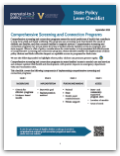Community-based doulas are trained social service professionals who provide non-clinical emotional, physical, and informational support to birthing people, starting during pregnancy and continuing during the postpartum period.
Rigorous research indicates that community-based doula services are an effective strategy to improve healthy birth outcomes such as reduced rates of preterm birth, low birthweight, and NICU admissions; increase attendance at health appointments; foster nurturing and responsive parenting behaviors; and increase breastfeeding initiation.
This checklist covers the following policy levers states may use to increase access to doulas:
- Partnership with doulas
- Insurance coverage
- Expanding access
- Workforce supports
- Funding




